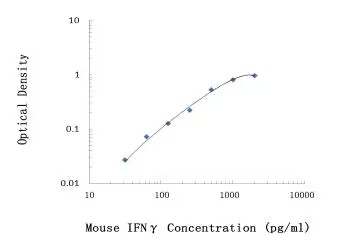Product Detail
Product NameMouse IFN-γ ELISA kit
ApplicationsELISA
Species ReactivityMs
SpecificityNatural and recombinant Mouse IFN-γ Ligand
Target NameMouse IFN-γ
Application Details
Detect Range: 31.2-2000pg/ml
Sensitivity: 15.6pg/mL
Sample Type: Serum, plasma, tissue homogenates and other biological fluids.
Sample Volume: 100 uL
Assay Time: 3-5h
Detection wavelength: 450 nm
Interferon gamma (IFN-γ) is a multifunctional protein first observed as an antiviral activity in cultures of Sindbis virus-infected human leukocytes stimulated by PHA (1). Produced by Tlymphocytes and natural killer (NK) cells, IFN-γ ?is now known to be both an inhibitor of viral replication and a regulator of numerous immunological functions. Human IFN-γ?is reported to be active only on human and non-human primate cells (5). The biochemistry and biological activities of the interferons have been extensively reviewed (2-9).
Mouse IFN-γ encodes a 155 amino acid (aa) residue precursor protein with a hydrophobic signal peptide that is cleaved to generate the 133 aa residue mature protein (10). In solution, IFN-γ has been shown to exist as a non-covalently associated homodimer with topological similarity to IL-10. Mouse IFN-γ shows approximately 40% aa sequence identity to human IFN-γ and there is no cross-reactivity across species (11,12).
A receptor for IFN-γ ?has been identified and its gene localized to chromosome 6 (13,14) Apparently the product of a single gene, the receptor is a single chain 90 kDa glycoprotein that shows a high degree of species-specific binding of IFN-γ?(15-18).
Functionally, IFN-γ ?produces a variety of effects. Produced by CD8+, NK, gd,and TH1 T helper cells, IFN-γ ?has documented antiviral, antiprotozoal and immunomodulatory effects on cell proliferation and apoptosis, as well as the stimulation and repression of a variety of genes (19-22) he antiprotozoal activity of IFN-γ ?against Toxoplasma and Chlamydia is believed to result from indoleamine 2,3-dioxygenase activity, an enzyme induced by IFN-γ ?(23).The immunomodulatory effects of IFN-γ? are extensive and diverse. In monocyte/macrophages, the activities of IFN-γ?include: increasing the expression of class I and II MHC antigens; increasing the production of IL-1, platelet-activating factor, H2O2, and pterin; protection of monocytes against LAK cell-mediated lysis; downregulation of IL-8 mRNA expression that is upregulated by IL-2; and, with lipopolysaccharide, induction of NO production.Finally, IFN-γ?has been shown to upregulate ICAM-1, but not E-Selectin or VCAM-1, expression on endothelial cells.
If you have published an article using product EK0496, please notify us so that we can cite your literature.
et al,Immature dendritic cells derived exosomes promotes immune tolerance by regulatIng T cell differentiation In renal transplantation. In AgIng (Albany NY) on 2019 Oct 26 by Pang XL, Wang ZG, et al..PMID:31655796
, (2019),
PMID:
31655796
et al,ALKBH5 promotes PD-L1-mediated immune escape through m6A modification of ZDHHC3 in glioma. In Cell Death Discov on 2022 Dec 24 by Wenhui Tang, Ningbo Xu, et al..PMID:36566230
, (2022),
PMID:
36566230
et al,Acute lung injury induced by recombinant SARS-CoV-2 spike protein subunit S1 in mice.
, (2025),
PMID:
39972348



 YES
YES



